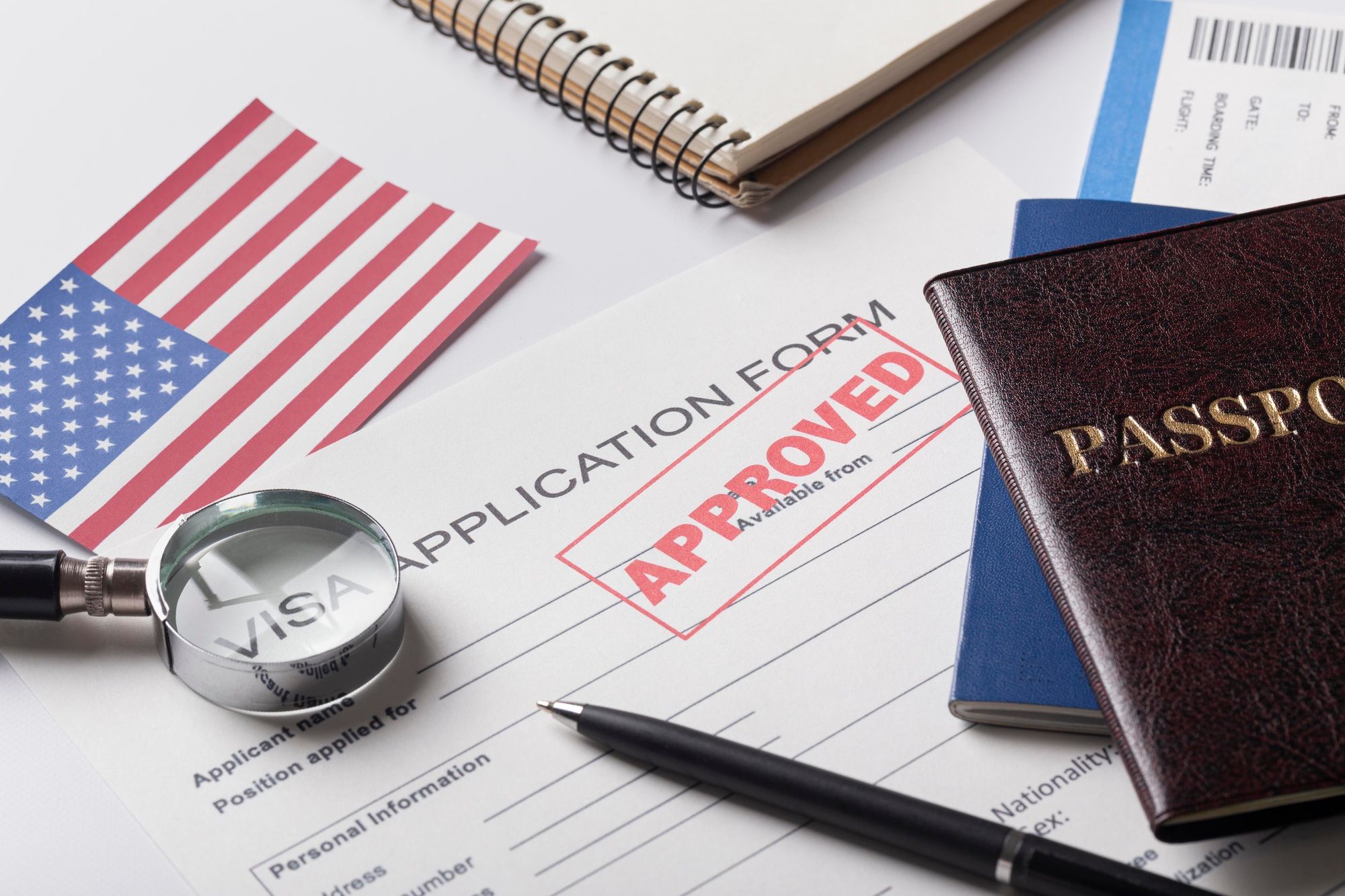Law
The Most Frequently Asked Questions About U.S. Immigration Law
Published
11 months agoon

Did you know that according to recent statistics, the United States grants legal permanent residency to over one million immigrants annually?
With millions of people seeking to navigate the complex immigration system each year, it’s crucial to stay informed about the latest regulations and processes.
In this blog post, we will address some of the most frequently asked questions about U.S. immigration law to provide you with a basic understanding of the subject.
Whether you’re a prospective immigrant, a concerned family member, or simply curious about the intricacies of U.S. immigration—this guide aims to provide you with valuable insights and answers to help demystify this important area of law.
20 Most Frequently Asked Questions About U.S. Immigration Law
Whether you are a hopeful fiancé visa applicant or someone fortunate enough to receive immigration sponsorship from a family member, we understand the universal questions that arise during the U.S. visa application process. It’s also advisable to seek guidance from a knowledgeable lawyer in United States who specializes in immigration law.
Our expertly curated answers draw upon the latest updates and changes in immigration policies, ensuring you receive the most accurate and up-to-date information available.
Let’s look at some of the most common questions that cross the minds of U.S. visa seekers.
1. What Is the Meaning of Family-Based Migration?
Family-based immigration refers to the process by which individuals can obtain U.S. permanent residency through familial relationships with either U.S. citizens or U.S. permanent residents.
In this immigration pathway, the sponsoring family member, who is a U.S. citizen or permanent resident, is commonly referred to as the “sponsor.” On the other hand, the family member who benefits from the immigration petition is known as the “beneficiary.”
2. Who Is Qualified to Sponsor a Family Member for Permanent Residency (Green Card)?
To be eligible to sponsor a relative for permanent residency, the sponsor must be a U.S. citizen or U.S. permanent resident who is at least 18 years old. Furthermore, the sponsor needs to generally reside within the United States or a U.S. territory, with some exceptions.
3. Are There Some Specified Obligations and Rules for Family Green Card Sponsors?
Yes, there are specified obligations and rules for family green card sponsors in the United States. When a U.S. citizen or lawful permanent resident sponsors a family member for a green card, they take on certain responsibilities, including the following:
- Financial support: As a sponsor, you must meet certain income requirements and be able to demonstrate your ability to financially support the immigrant. If your income falls below the required threshold, you may need to obtain a joint sponsor to meet the financial obligations.
- Affidavit of support: You are required to sign an Affidavit of Support (Form I-864) to demonstrate your commitment to financially support the immigrant. By signing this document, you agree to provide financial support to the sponsored family member until they become a U.S. citizen, have worked and paid into Social Security for 40 quarters, die, or leave the country permanently.
- Reporting changes: As a sponsor, you are obligated to report any significant changes in your circumstances to the U.S. Citizenship and Immigration Services (USCIS). This includes changes in your address, marital status, or income level. Failure to report these changes may have legal consequences.
- Repayment of public benefits: If the sponsored immigrant receives means-tested public benefits (such as Medicaid or Temporary Assistance for Needy Families) while the affidavit of support is in effect, the sponsoring individual may be responsible for repaying those benefits to the government.
4. Which Relatives Can Be Sponsored by U.S. Native Citizens?
As a U.S. citizen, you have the ability to petition for various relatives, including:
- Your spouse
- Children of any marital status and age
- Siblings (if you are at least 21 years old, which is the legal age for maturity in the majority of U.S. states)
- Parents (if you are at least 21 years old)
5. Which Relatives Can Be Sponsored by Green Card Holders (Permanent Citizens)?
If you are a U.S. permanent resident (Green Card holder), you can also petition for your spouse and unmarried children.
6. What Does the Fiance Visa Enable?
The “K-1” visa, commonly known as Fiancé(e) visa, allows foreign citizens to cross the U.S. border for the purpose of marrying an American citizen. Their entry is on a temporary basis, while the marital status will further adjust their status to become a lawful permanent resident.
7. How Is a Conditional Green Card Different From a Regular One?
A beneficiary’s permanent resident status is considered conditional if it is based on a marriage that is less than two years old at the time they become a permanent resident.
This conditional permanent resident status is granted when the beneficiary is either admitted to the U.S. on an immigrant visa or adjusts their status to that of a permanent resident.
A U.S. citizen child can only petition for their parents to obtain permanent residency once they reach the age of 21.
8. How Do I Start The Green Card Process for My Spouse Who Is Outside of the U.S. Borders?
If your spouse is outside of the U.S., the permanent residency process begins by filing a petition with U.S. Citizenship and Immigration Services (USCIS), requesting that USCIS notifies a U.S. Consulate in the country where your spouse resides.
9. How Can I Stay Informed About the Availability of My Visa?
Information on visa availability can be found in the current and upcoming visa bulletins, which are publicly available at the Bureau of Consular Affairs of the U.S. Department of State.
These bulletins provide recent information and updates on the visa availability for those seeking to file for a family-sponsored or an employment-based visa.
10. Are Public Schools Free for Foreign Students Who Are Not Permanent Residents?
There are limitations and requirements under U.S. law regarding foreign students in F-1 status attending public secondary or high schools. Secondary school attendance is limited to 12 months.
11. How Can One Become a U.S. Citizen?
U.S. citizenship can be acquired through birth, naturalization, or military service. Those born in the U.S. or to U.S. citizens may acquire citizenship by birth.

12. What Is the H-1B Visa?
The H-1B visa is one of the most popular work visas in the U.S. It is a dual-intent visa with a maximum duration of stay of six years (initially three years with the possibility of extension), with some exceptions.
13. What Is Deportation?
The deportation or removal process refers to the formal removal of a foreign national from the United States due to a violation of immigration laws.
14. What Is Unlawful Presence?
Unlawful presence refers to the period during which a foreign national is in the United States without being lawfully admitted or paroled, or not in a period of stay authorized by the Secretary of Homeland Security.
15. What Is the Special Immigrant Juvenile Status?
Special Immigrant Juvenile Status is a unique way of obtaining permanent residency (Green Card) for certain undocumented immigrants under the age of 21.
These young people are already within the U.S. border but have experienced neglect, abuse, or abandonment by one or both parents. This, in the meantime, grants them the option to seek lawful permanent residence in the United States.
16. What Are My Main Rights as an Immigrant in the United States?
As an immigrant, you possess the following rights:
- The right to remain silent
- No obligation to consent to search or answer certain questions
- Right to consult with a lawyer if detained by ICE (Immigration and Customs Enforcement)
- Right to contact consulate if detained
- Require a warrant to enter your home or search your property
- Request warrant to be shown through a window or under the door
- Request badge or identification
However, it’s important to consult with an experienced immigration attorney to fully understand and protect your rights in specific legal situations.
17. What Is the Most Commonly Requested Visa in the U.S.?
The most requested visa in the U.S. depends on the purpose of travel and individual circumstances. However, one of the most popular and highly sought-after visas is the H-1B visa, which allows skilled foreign workers to temporarily work in specialized occupations in the United States.
Other commonly sought visas include the B-1/B-2 tourist/business visa, F-1 student visa, and family-based immigrant visas. It is important to consult with an immigration attorney or review the official U.S. Citizenship and Immigration Services (USCIS) website to determine the most appropriate visa for your specific situation.
18. Can One Become a U.S. Citizen Through Asylum?
Yes, it is possible to become a U.S. citizen through asylum. If an individual is granted asylum in the United States, they can apply for permanent residency after one year. After holding permanent residency for a certain period of time, (typically five years) they may then be eligible to apply for U.S. citizenship through the naturalization process.
It is important to consult with an immigration attorney or review the official USCIS website for detailed information and guidance on the specific requirements and procedures involved in obtaining U.S. citizenship through asylum.
19. What Is the Concept of “Marrying for Papers”?
The concept of “marrying for papers” refers to a situation where an individual enters into a marriage solely for the purpose of obtaining immigration benefits or legal status in a country, often without genuine intention or commitment to the spouse.
As such, “marrying for papers” is considered a form of immigration fraud and is illegal in the U.S.
Immigration authorities have measures in place to detect and investigate fraudulent marriages, such as interviews, background checks, and scrutiny of the couple’s relationship and supporting documentation.
20. How Long Do I Have to Wait to Become a U.S. Citizen?
The average time to become a U.S. citizen can vary depending on various factors, including the individual’s immigration status, the pathway to citizenship chosen, and the specific circumstances of the case. Generally, the naturalization process involves several steps and can take several years to complete.
For most individuals, the path to U.S. citizenship begins with obtaining lawful permanent resident status, also known as a green card. The time it takes to acquire a green card can range from several months to several years, depending on factors such as family relationships, employment sponsorship, refugee or asylum status, or other qualifying criteria.
After obtaining a green card, there are typically two main pathways to becoming a U.S. citizen: naturalization and citizenship through marriage to a U.S. citizen.
For naturalization, the general requirements include being at least 18 years old, having continuous residence in the United States for a specific period (usually five years, but three years if married to a U.S. citizen), demonstrating good moral character, passing an English language and civics test, and taking an oath of allegiance. The processing time for naturalization applications can vary, but it typically ranges from six months to over a year.
In the case of citizenship through marriage to a U.S. citizen, the waiting period is generally shorter. If you have been married to a U.S. citizen for at least three years and have been a lawful permanent resident during that time, you may be eligible to apply for naturalization sooner than individuals who are not married to U.S. citizens.
It’s important to note that processing times for immigration applications can fluctuate due to various factors, including government backlogs and policy changes. It’s advisable to consult with an immigration attorney or accredited representative to understand the specific requirements and estimated waiting times based on your individual circumstances.
Summary
Embarking on the path of U.S. Immigration Law can be a complex journey, filled with questions and uncertainties. From family-based sponsorship to naturalization and asylum, the intricacies of immigration demand careful consideration.
While each case is unique, understanding the obligations, processes, and eligibility requirements can pave the way toward a successful immigration experience.
Recent News


4 Amazing Trips for Your Family
Choosing somewhere for a family vacation that would pique the attention of adults and kids alike can be a fun...


Customising Your Makeup with Blendable Blush Options
In cosmetics, one’s face is a canvas for self-expression and creativity. Among the myriad of products available, blush is a...


The Benefits of Regular Home Maintenance
Regular home maintenance is essential for maintaining and even raising the value of your house. A proactive approach to repairs...


Understanding the Importance of SEO in Adelaide
In the digital marketplace, Adelaide businesses are in a continuous contest to gain the attention of their target audiences. With...


Breaking Down the Numbers: Understanding the Average Traveling Nurses Pay
The open road, adventure, and the chance to heal – travel nursing promises an undeniable allure. But amidst the excitement,...


Dealing with Oily Skin in Summer: Tips and Tricks
As the temperature rises, those with oily skin often face an additional challenge—maintaining a clear and balanced complexion. Excess oil...


Mountain Wedding Ideas for 2024
A mountain wedding is a stunning choice for couples who cherish nature and desire a distinctive wedding experience. Whether you...


3 Of The Best Ways To Keep Your Salon Clean
It is of the utmost importance to ensure that a salon is kept scrupulously clean, not just for the sake...


3 Reasons You Should Get Blood Tests Every Year
Regular blood tests are essential for preserving general health and identifying potential problems early on. Medical professionals can evaluate your...


How to Make Your Next Crafts Project Pop
Crafting is a creative outlet that allows individuals to express themselves through various mediums such as paper crafts, sewing, painting,...
